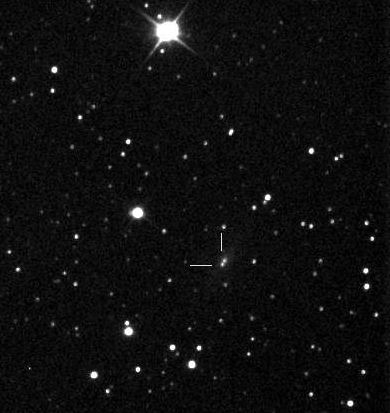SN 2014ci (A.R., 22 34 04.80 Dec. +68 26 24.0), discovered on july 15th, 2014 in the galaxy PGC 166758 (offset 2E 4S), magnitude 17.2, tipe: Ia SN discoverer: Paolo Campaner (Newton 16" - Ponte di Piave Observatory - Treviso, Italy).

Electronic Telegram No. 3947 Central Bureau for Astronomical Telegrams INTERNATIONAL ASTRONOMICAL UNION CBAT Director: Daniel W. E. Green; Hoffman Lab 209; Harvard University; 20 Oxford St.; Cambridge, MA 02138; U.S.A. e-mail: Questo indirizzo e-mail è protetto dallo spam bot. Abilita Javascript per vederlo. (alternate Questo indirizzo e-mail è protetto dallo spam bot. Abilita Javascript per vederlo. ) URL http://www.cbat.eps.harvard.edu/index.html Prepared using the Tamkin Foundation Computer Network SUPERNOVA 2014ci = PSN J22340480+6826240 P. Campaner reports the discovery of an apparent supernova (magnitude 17.2) on unfiltered CCD images (limiting magnitude 19.0) obtained on July 16.035 UT with a 0.4-m telescope (+ Atik 428ex camera) at Ponte di Piave, Italy, in the course of the Italian Supernovae Search Project. The new object is located at R.A. = 22h34m04s.80, Decl. = +68d26'24".0 (equinox 2000.0), which is 2" east and 4" south of the center of the galaxy PGC 166758. The variable was designated PSN J22340480+6826240 when it was posted at the Central Bureau's TOCP webpage and is here designated SN 2014ci based on the spectroscopic confirmation reported below. G. Masi writes that his unfiltered exposures taken on July 17.97 with a 43-cm telescope at Ceccano, Italy, yield mag 16.3 for 2014ci, for which he measured position end figures 04s.26, 26s.7. L. Tomasella, S. Benetti, A. Pastorello, E. Cappellaro, N. Elias-Rosa, P. Ochner, and M. Turatto report that an optical spectrogram (range 340-820 nm; resolution 1.3 nm) of PSN J22340480+6826240 = SN 2014ci, obtained on July 18.95 UT with the Asiago 182-cm Copernico Telescope (+ AFOSC) under the Asiago Transient Classification Program (Tomasella et al. 2014, as posted at URL http://arxiv.org/abs/1403.7233), shows that this is a normal type-Ia supernova. Assuming a recessional velocity of 4355 km/s (Paturel et al. 2003, A.Ap. 412, 57; via NED) for the host galaxy, PGC 166758, a good match is found with several type-Ia supernovae about three weeks after B-band maximum light. An expansion velocity of 9300 km/s is derived from the minimum of the Si II 635-nm line. The Asiago classification spectrum is posted at website URL http://sngroup.oapd.inaf.it. Classification was made via GELATO (Harutyunyan et al. 2008, A.Ap. 488, 383) and SNID (Blondin and Tonry 2007, Ap.J. 666, 1024). NOTE: These 'Central Bureau Electronic Telegrams' are sometimes superseded by text appearing later in the printed IAU Circulars. (C) Copyright 2014 CBAT 2014 August 30 (CBET 3947) Daniel W. E. Green




